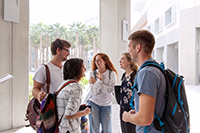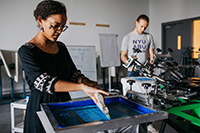-
Academics
-
Admissions
 Your journey to NYUAD starts here. Attend an application workshop or information session.Admissions Events
Your journey to NYUAD starts here. Attend an application workshop or information session.Admissions Events -
Research
-
Campus Life
 Live the possibilities. Be part of a dynamic community of students from over 115 countries.Take a Tour
Live the possibilities. Be part of a dynamic community of students from over 115 countries.Take a Tour - Public Programs
-
About
Exceptional education. World class research. Community-driven.Our Story
- News
- Events
- Social Media Directory
- Press Room
-
- Torch at NYUAD
- Faculty
- Current Students
- Alumni
- عربي
Understanding the Environmental Impact of Wastewater and Sewage Plants in the Arabian Coral Reefs
The Arabian Gulf - the world's hottest sea - is a natural laboratory to understand how coastal and marine organisms cope with and respond to extreme temperatures and local stressors. This information can provide important insights into how marine ecosystems across the world may respond to climate change pressure in the near future. The research team focuses on coral reefs and reef fishes, seagrass beds and mangrove forests, using tools that range from genomics and molecular biology to physiology and behavioral ecology to remote sensing of ecosystem change.
In order to understand how local stressors can exacerbate the extreme conditions of the Gulf, this project is an experimental study on how high nutrients concentration due to wastewater plants’ inputs impact the physiology of corals. To date, this is a nearly unexplored field within the Gulf despite the importance of these kinds of plants. Moreover, this project can be an important beginning to analyze if and how local human impacts can exacerbate the consequences of climate change in the region.
